人教版高中英语必修一unit1经典教案
- 格式:doc
- 大小:94.50 KB
- 文档页数:10
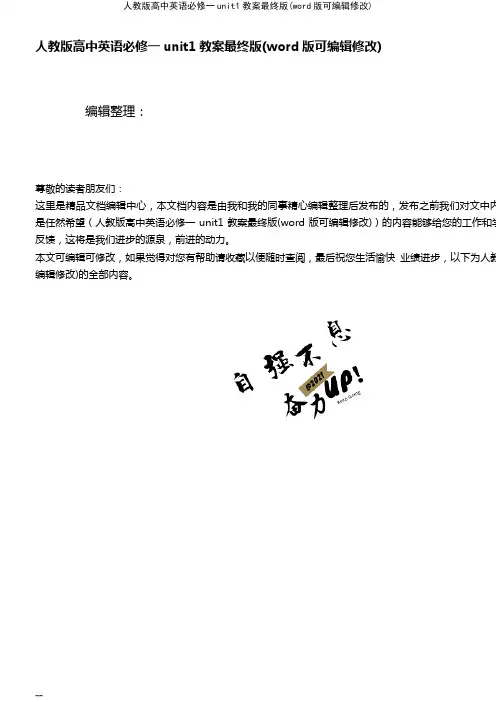
人教版高中英语必修一unit1教案最终版(word版可编辑修改)编辑整理:尊敬的读者朋友们:这里是精品文档编辑中心,本文档内容是由我和我的同事精心编辑整理后发布的,发布之前我们对文中内是任然希望(人教版高中英语必修一unit1教案最终版(word版可编辑修改))的内容能够给您的工作和学反馈,这将是我们进步的源泉,前进的动力。
本文可编辑可修改,如果觉得对您有帮助请收藏以便随时查阅,最后祝您生活愉快业绩进步,以下为人教编辑修改)的全部内容。
Teaching Plan Unit1 Friendship 教材人教版高中英语必修一试讲者李瑶单位适用年级高中一年级单元课题Anne’s Best Friend课时共( Reading)一.教材分析 Analysis of the Teaching MaterialsThis unit is the first unit of the senior English stud friendship。
As for the students, at the beginning of s making new friends is one of important things for them this unit is appropriate at the present time. It can e students’interests in English learning and help stude choose friends and the meaning of the friendship。
The the center of the unit。
It mainly talks about the Ann during the world war II, regarded the diary as her be her happiness, sorrow and missing to her hometown。
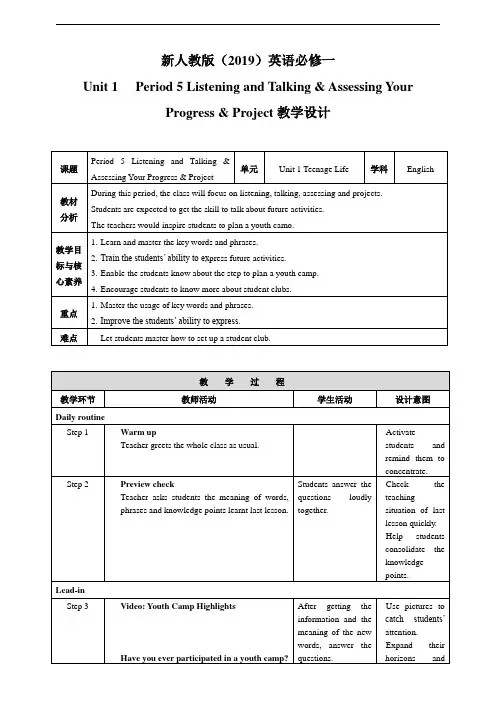
新人教版(2019)英语必修一Unit 1 Period 5 Listening and Talking & Assessing Your Progress & Project教学设计Listen again. Underline the expressions in the sentences above that Cao Jing and Max use to talk about the future.Step 7 Talking about future activitiesWe'll learn survival skills.I'll learn how to make a fire.We'll learn how to live in the wild from someexperts.We're going to learn about wildlife. I think it'sgoing to be fun.I plan to improve my spoken English. We'll talkabout teenage life.There'll be students from different countries atthe camp.I'm going to give a speech.I hope to make some friends.Here are some interesting, educational youthcamps.Student Debate CampSkills and Areas of FocusStructuring Arguments Students learn howto express.-Get the tips ofexpression.-Improve theirtalking skill.out of school. Most live in poor countries, butthere are also some boys and girls who cannotgo to school in rich countries. If you are one ofthe lucky ones who can go to a senior highschool, you should be grateful for theopportunity. So, the next time you feel like youdo not want to do boring, difficult homework orgo to class, think about the children who don'thave the chance to get a good education. Makethe most of your education and make the worlda better place.keys:What are the functions of the phrases?The phrases provide more specific detailsand enrich the meaning of the text.DiscussionDo you agree with the writer’s opinion?Share with your opinion with your partnerand give your reasons.ProjectStep 10 Set up a student clubchoose one of the clubs from below, or create Learn how toprepare the project.-Help students tomaster practicalskills.a new club you think others would beinterested in joining.Decide on the following details of your club.Design an eye-catching logo for your cluband make a poster including the club'sname, slogan, and logo.Step 11 Prepare an introduction to recruit new members during a school assembly. Includesome details that are not mentioned on yourposter.EXAMPLEHello, everyone! We're very pleased tointroduce our club to you. It is called ... Ourslogan is ..., and our club aims to ...Step 12 Language pointsTeacher explains the language points andmakes some exercise.1.expert n. 专家;行家adj. 熟练的;内行的;专家的be expert at/in doing sth 在…方面内行/专长她是一个在科学实验方面著名的专家。
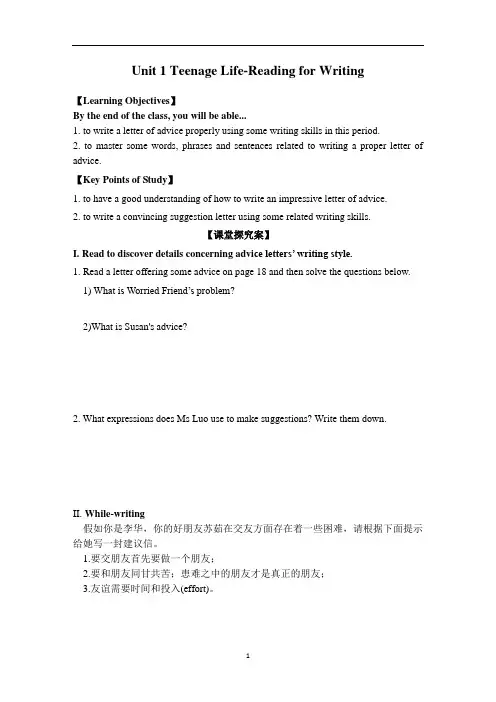
Unit 1 Teenage Life-Reading for Writing【Learning Objectives】By the end of the class, you will be able...1. to write a letter of advice properly using some writing skills in this period.2. to master some words, phrases and sentences related to writing a proper letter of advice.【Key Points of Study】1. to have a good understanding of how to write an impressive letter of advice.2. to write a convincing suggestion letter using some related writing skills.【课堂探究案】I.Read to discover details concerning advi ce letters’ writing style.1. Read a letter offering some advice on page 18 and then solve the questions below. 1) What is Worried Friend’s problem?2)What is Susan's advice?2. What expressions does Ms Luo use to make suggestions? Write them down.II.While-writing假如你是李华,你的好朋友苏茹在交友方面存在着一些困难,请根据下面提示给她写一封建议信。
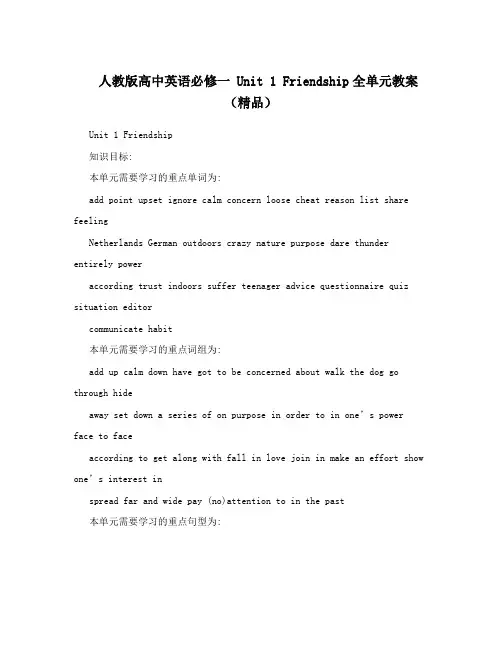
人教版高中英语必修一 Unit 1 Friendship全单元教案(精品)Unit 1 Friendship知识目标:本单元需要学习的重点单词为:add point upset ignore calm concern loose cheat reason list share feelingNetherlands German outdoors crazy nature purpose dare thunder entirely poweraccording trust indoors suffer teenager advice questionnaire quiz situation editorcommunicate habit本单元需要学习的重点词组为:add up calm down have got to be concerned about walk the dog go through hideaway set down a series of on purpose in order to in one’s power face to faceaccording to get along with fall in love join in make an effort show one’s interest inspread far and wide pay (no)attention to in the past本单元需要学习的重点句型为:1. You want to see a very interesting film with your friend, but your friend can’t go until he or she finishes cleaning the bicycle. (not. . . until. . . )2. When he or she borrowed it last time, he or she broke it and you had to pay to get itrepaired. (get sth. done)3. While walking the dog, you were careless and it got loose and was hit by a car. (while doing; get+adj. )4. Your friend, who doesn’t work hard, asks you to help him or her to cheat in the exam by looking at your paper, what will you do? (the Attributive Clause)5. I don’t want to set down a series of facts in a diary as most people do, but I want this diary itself to be my friend. (as. . . )6. I wonder if it’s because I haven’t been able to be outdoors for so long time that I’ve grownso crazy about everything to do with nature. (I wonder if/whether; it’s . . . that. . . )7. . . . I stayed awake on purpose until half past eleven one evening in order to have a goodlook at the moon for once by myself. (stay+adj. ; in order todo. . . )8. But as the moon gave far too much light, I didn’t dare open a window. (don’t dare(to)do. . . )9. . . . it was the first time in a year and a half that I’d seen the night face to face. . . (It is/was the first/second. . . time that+现在/过去完成时)10. Although I really try to talk to my classmates, I still find it hard to make good friendswith them. (find it+adj. /n. +to do. . . )本单元需要掌握的交际功能用语为:1. 态度(attitudes)Are you afraid that. . . ? I’ve grown so crazy about. . . I didn’t dare. . .2. 同意和不同意(agreement and disagreement)I agree. I think so. Exactly.I don’t agree. I don’t think so. I’m afraid not.3. 肯定程度(certainty)That’s correct. Of course not.本单元需要掌握的语法为:直接引语和间接引语(?):陈述句和疑问句1. 陈述句“I don’t want to set down a series of facts in a diary, ” said Anne.? Anne said that she didn’t want to set down a series of facts in a diary.2. 一般疑问句He asked, “Are you leaving tonight? ”? He asked us whether we were leaving that night.3. 特殊疑问句“When did you go to bed last night? ” father said to Anne.? Father asked Anne when she went to bed the night before.能力目标:1. 能运用所学语言讲述朋友间发生的事情以及朋友间的友谊和友情。
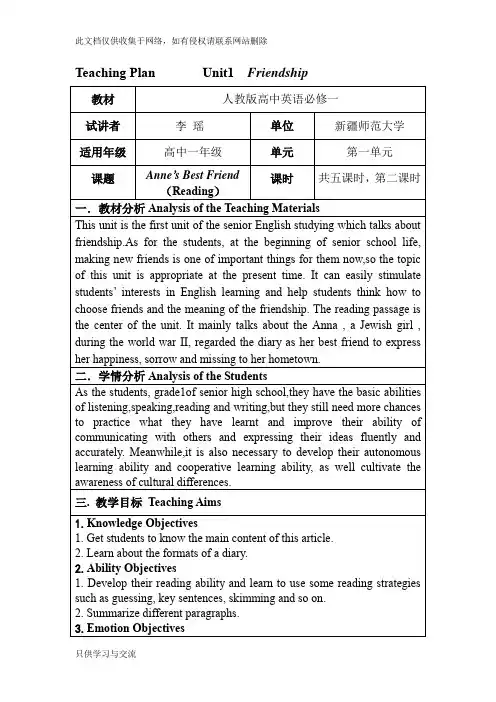
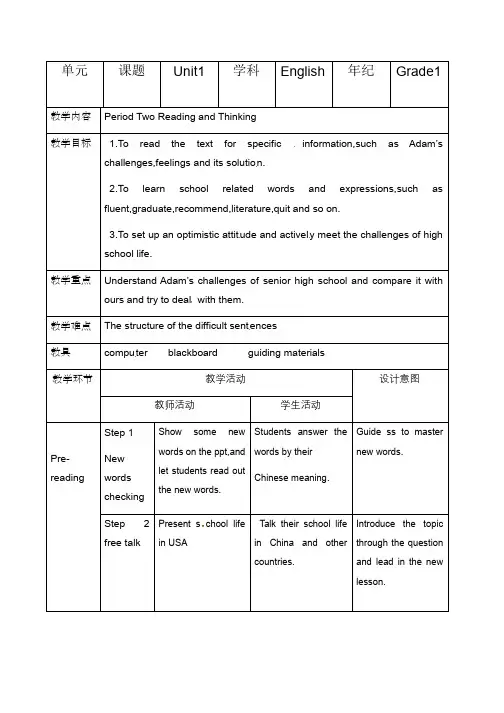
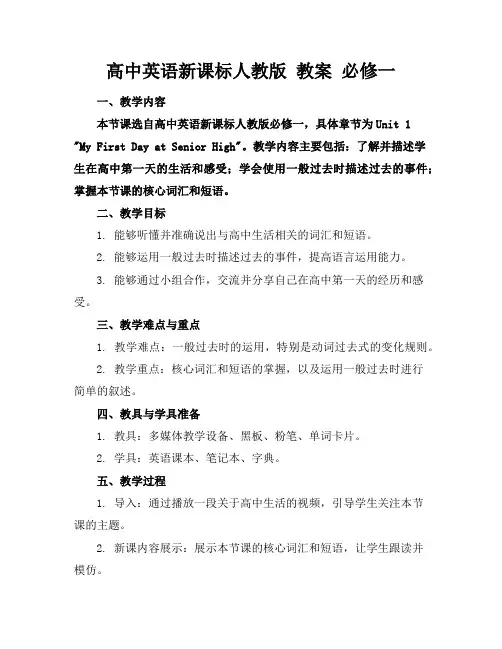
高中英语新课标人教版教案必修一一、教学内容本节课选自高中英语新课标人教版必修一,具体章节为Unit 1 "My First Day at Senior High"。
教学内容主要包括:了解并描述学生在高中第一天的生活和感受;学会使用一般过去时描述过去的事件;掌握本节课的核心词汇和短语。
二、教学目标1. 能够听懂并准确说出与高中生活相关的词汇和短语。
2. 能够运用一般过去时描述过去的事件,提高语言运用能力。
3. 能够通过小组合作,交流并分享自己在高中第一天的经历和感受。
三、教学难点与重点1. 教学难点:一般过去时的运用,特别是动词过去式的变化规则。
2. 教学重点:核心词汇和短语的掌握,以及运用一般过去时进行简单的叙述。
四、教具与学具准备1. 教具:多媒体教学设备、黑板、粉笔、单词卡片。
2. 学具:英语课本、笔记本、字典。
五、教学过程1. 导入:通过播放一段关于高中生活的视频,引导学生关注本节课的主题。
2. 新课内容展示:展示本节课的核心词汇和短语,让学生跟读并模仿。
3. 例题讲解:以"Yesterday was my first day at senior high. I"为例,讲解一般过去时的用法。
4. 随堂练习:让学生运用一般过去时,描述自己在高中第一天的经历。
5. 小组活动:学生分成小组,互相交流并分享自己的经历,提高语言表达能力。
六、板书设计1. 核心词汇和短语:写在黑板的左边,方便学生查看。
2. 一般过去时的结构:写在黑板的右边,突出教学重点。
七、作业设计1. 作业题目:请用一般过去时描述你昨天的一天。
2. 答案示例:Yesterday was my busy day. I got up at 6:00, had breakfast and went to school. In the morning, I had four classes. After lunch, I played basketball with my friends. In the evening, I did my homework and watched TV.八、课后反思及拓展延伸1. 课后反思:本节课学生对于一般过去时的掌握程度较好,但仍有个别学生动词过去式变化不准确,需加强练习。
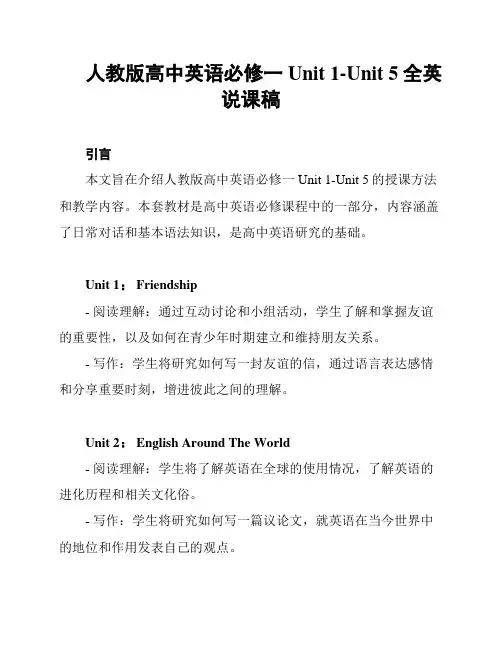
人教版高中英语必修一Unit 1-Unit 5全英说课稿引言本文旨在介绍人教版高中英语必修一Unit 1-Unit 5的授课方法和教学内容。
本套教材是高中英语必修课程中的一部分,内容涵盖了日常对话和基本语法知识,是高中英语研究的基础。
Unit 1: Friendship- 阅读理解:通过互动讨论和小组活动,学生了解和掌握友谊的重要性,以及如何在青少年时期建立和维持朋友关系。
- 写作:学生将研究如何写一封友谊的信,通过语言表达感情和分享重要时刻,增进彼此之间的理解。
Unit 2: English Around The World- 阅读理解:学生将了解英语在全球的使用情况,了解英语的进化历程和相关文化俗。
- 写作:学生将研究如何写一篇议论文,就英语在当今世界中的地位和作用发表自己的观点。
Unit 3: Travel journal- 阅读理解:通过阅读游记和旅行日记,学生将扩大英语词汇量和了解不同的文化和历史。
- 写作:学生将研究如何写一篇旅行日记,描述自己的旅行经历和感悟,提高英语写作的能力。
Unit 4: Amazing Science- 阅读理解:学生将了解科学发展的历史,以及人类对自然的探索和解释;学会如何从科学文章中获取信息。
- 写作:学生将研究如何写一篇科普短文,介绍感兴趣的科学领域的最新进展。
Unit 5: Music- 阅读理解:学生将了解音乐的历史和文化,掌握音乐相关的词汇和概念。
- 写作:学生将研究如何写一篇关于音乐的文章,和同学分享自己对音乐的喜好和见解。
结论本文介绍了人教版高中英语必修一Unit 1-Unit 5的授课方法和教学内容,通过丰富的教学活动和提高英语写作能力,全面提升学生的英语水平和综合素质。
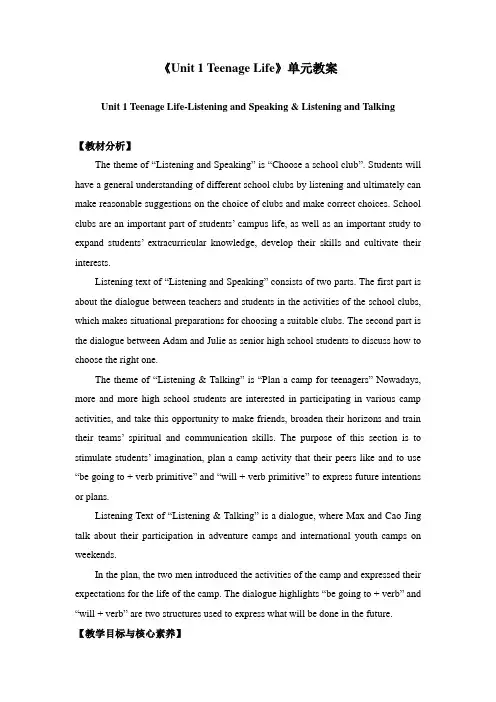
《Unit 1 Teenage Life》单元教案Unit 1 Teenage Life-Listening and Speaking & Listening and Talking【教材分析】The theme of “Listening and Speaking” is “Choose a school club”. Students will have a general understanding of different school clubs by listening and ultimately can make reasonable suggestions on the choice of clubs and make correct choices. School clubs are an important part of students’ campus life, as well as an important study to expand students’extracurricular knowledge, develop their skills and cultivate their interests.Listening text of “Listening and Speaking” consists of two parts. The first part is about the dialogue between teachers and students in the activities of the school clubs, which makes situational preparations for choosing a suitable clubs. The second part is the dialogue between Adam and Julie as senior high school students to discuss how to choose the right one.The theme of “Listening & Talking” is “Plan a camp for teenagers” Nowadays, more and more high school students are interested in participating in various camp activities, and take this opportunity to make friends, broaden their horizons and train their teams’spiritual and communication skills. The purpose of this section is to stimulate students’ imagination, plan a camp activity that their peers like and to use “be going to + verb primitive” and “will + verb primitive” to express future intentions or plans.Listening Text of “Listening & Talking” is a dialogue, where Max and Cao Jing talk about their participation in adventure camps and international youth camps on weekends.In the plan, the two men introduced the activities of the camp and expressed their expectations for the life of the camp. The dialogue highlights “be going to + verb” and “will + verb” are two structures used to express what will be done in the future.【教学目标与核心素养】1. Instruct students to get main facts by listening and motivate them to talk about the topics about how to choose a right school club, how to plan a camp for the future, and how to talk about future activities.2. Develop students’sense of cooperative learning and individual thinking capability.3. Develop students’different listening skills to solve different listening comprehensive problems.4. Help students to understand how to use the structures “be going to do, will do, plan to do, there will be, hope to do” to discuss their future plans and activities.【教学重难点】Prompt Ss to talk about the related topics, such as how to choose a right school club, how to make a camp for the future, how to make a camp plan and how to talk about future activities.【教学过程】Step 1 Listening and SpeakingLead inThe teacher is advised to talk with their students about school clubs that they were in when they were at junior high school: boys and girls, have you ever taken part in any school clubs before and why you chose them? After the small talk, the teacher can move on by finishing the following listening task:Listen to the first two conversations and choose the correct answers.1. What are they learning about in Conversation 1?A. Hearing.B. Sounds.C. Dogs.2. The students are discussing in Conversation 2.A. schoolworkB. relationshipsC. dating3. Circle the two clubs where these two conversations happened.A. Science ClubB. Ballet ClubC. Nature ClubD. Debate Club.Learning tip:After finishing the task above, the teacher is expected to play Conversation 3 which is about how to help Adam choose a right club and after finishing listening for the first time, the students need to solve the following task.Listen to Conversation 3. Then help Adam choose a club.Tick the activities that happen in each club.Ballet Club○ learn new movements○ make ballet clothes○ watch dance programmesNature Club○ watch biology lectures○ grow plants○ work in a greenhouseCartoon Club○ watch cartoons○ write stories○ draw cartoonsVolunteer Club○ help old people○ clean up parks○ give directionsAfter finishing the task above, the teacher is expected to play Conversation 3 again and solve the following task.1. Adam says that he likes ___________ but is not so interested in___________.2. Which club do you think is suitable for Adam? Why?I think Adam should join the _________Club because he says that he_________.Finally, after finishing the task above, the teacher is expected to instruct students to work in groups to finish the following project:Speaking ProjectWork in pairs. Help each other choose a school club.EXAMPLEA: Hi, Sam! I’ve decided to join the Music Club.B: Good decision!A: How about you? Are you going to join a club?B: Yes. I’m wondering which one I should choose: the Acting Club or the Ballet Club?A: I guess the question is... Do you like dancing better than acting?B: Actually, I like acting better, but my friends go to the Ballet Club and I want to be with them.A: Hmm ... If you ask me, I think you should choose what you like.Pronunciation part1. Have the Ss listen and repeat, then add more words to each group.2. Then listen to the proverbs and repeat. Have the Ss notice the pronunciation of the letters in bold.Step 2 Listening and Talking1. The teacher is advised to talk with their new students about the related topic: Boys and girls, do you know some structures to talk about future activities?Talking about future activitiesWe’ll …I plan to …There’ll be …I hope to …We’re going to …2. After their small talk, the teacher can move on by playing the listening and solve the following task.Underline the expressions in the sentences below Cao Jing and Max use to talk about the future.We’ll learn useful skills.I plan to improve my spoken English.There’ll be students from different schools.I hope to make new friends.We’ll talk about teenage life.I’ll learn to make a fire.There’ll be students from different countries at the camp.There’ll be some experts there to show us how to live in the wild.We’re going to learn about wildlife.I’m going to give a speech.I think I’m going to enjoy the activities.I think we’ll have a lot of fun.3. Work in groups. Plan a youth camp.Teacher make the Ss think of ideas for the camp. And they can use the questions below to get started. And have the Ss present their ideas for a youth camp to the class.●What kind of camp is it?●Who will be there?●What will they do?●Wh at will they learn?EXAMPLE______________campDo you want to have fun and learn at the same time? Then come to our camp. In our camp, you can learn about... There’ll be many interesting activities. First, we are going to... Then we’ll... We also plan to… Finally, we’ll... Please come to our camp!Unit 1 Teenage Life-Reading and Thinking【教材分析】The topic of this unit is about teenage life, which belongs to the theme context of “humans and oneself”.As teenagers who shoulder the responsibility of “Chinese great dream”, they must fully know themselves, including their strengths, weaknesses and challenges etc. They are supposed to improve themselves continuously and readily study their subjects, and thus foster their strategies and confidence in lifelong studies.This period is entitled the freshmen challenges, which mainly concerns some big challenges for new students in Senior high school. In this period, a teacher should lead students to find out what their challenges are and guide them to figure out how to crack the challenges and better themselves. More importantly, a teacher should instruct students to absorb new language points and appreciate the language. Besides, a teacher must instruct students to acquire some skills concerning reading efficiently and inspire them to talk more about their new school life, especially their newproblems and solutions both at school and in life.【教学目标与核心素养】1. Enable students to acquire the basic usage of the new words and expressions concerning the freshmen challenges and learn to use them flexibly.2. Enable students to have a good understanding of the freshmen challenges in the new senior high school which is quite different from junior middle school.3. Develop students’ sense of cooperative learning and individual thinking capability.4. Develop students’ different learning skills to solve different r eading comprehensive problems.【教学重难点】1. Develop students’ reading ability such as skimming, scanning and summarizing.2. Let students talk about their new school challenges in senior high school and encourage them to find the possible solutions to conquer them.【教学过程】1. Warming upStep 1 Leading-inHave a free talk with students. Ask them the following questions:How do you feel about your senior high school? Have you come across some challenges that make you upset?Step 2 Pre-readingLet students guess what the text will be mainly about before reading by looking at the picture and the title.Step 3 Reading1. Fast readingAsk students to skim the reading passage to sum up the main idea of each paragraph and then discuss it with their partners.Paragraph1.________________________________________________2.________________________________________________3.________________________________________________4.________________________________________________Tips: you can find main ideas by first taking at quick look at the title, picture, key words and phrases and topic sentences.2. Intensive readingAllow students to read carefully this time to understand the main details of each paragraph and then finish the following.1. 1. Adam felt __________at the beginning of his senior highA. excitedB. interestedC. confusedD. worried2. Who gave Adam advice on courses?A. Parents.B. Adviser. C .Coach. D. Classmates.3. What subject is Adam's favorite?A. Chinese.B. World history.C. Math.D. English.4. Hearing he was poor in playing football well, AdamA. felt disappointed but went on with itB. left the football and joined a clubC. didn't give up and tried to improveD. felt unhappy but signed up for a new team5. What kind of person is Adam?A. brave and well preparedB. negative and sillyC. active and shyD. gentle and patient2. Let students look through the chart first and then read the text silently. Three minutes later, check the answers with the whole class. Show the suggested answers on the screen.Step 4 Further Reading and discussionRead the text the third time and work in pairs to do the following.1.What does “make the team” in Paragraph 3 mean?2.Do you face the same challenges as Adam? What other challenges areyou facing?3.What are some differences between Adam’s school life and your schoollife?Step 5 Passage ConsolidationComplete the passage with the suitable words from the passage.I'm Adam, 1._______freshman in senior high school. The first week was a little 2. _____ (confuse).There are some 3. _____ (challenge) I have to face in my new school life. First, I had to think carefully about my courses. Chinese is hard to learn, but I hope I can speak it _____ (fluent) when I graduate. My adviser 5. _____ (recommend) me to sign up for advanced literature because I'm good 6. _____it. Second, I had to choose my extra-curricular activities. I tried 7. _____ (join) the school football team though I couldn't do well in 8. _____at first. Besides that, I joined a volunteer club.In order to be well 9. _____ (prepare) for university or whatever else10. _____ (come) in the future, I make up my mind to study harder and get used to new situation.Step 6 Homework1. Write a passage to introduce you first senior school challenges and how to solve them. (about 120words)2. Learn the useful new words and expressions in this part by heart.Unit 1 Teenage Life-Discovering Useful Structure【教材分析】This teaching period mainly deals with the grammar: Phrases.This period carries considerable significance to the cultivation of students’ writing competence and lays a solid foundation for the basic appreciation of language beauty. The teacher is expected to enable students to master this period thoroughly and consolidate the knowledge by doing some exercise of good quality.【教学目标与核心素养】1. Get students to have a good understanding of the basic usages of phrases, including adjective phrases, adverb phrases and noun phrases.2. Enable students to use the basic phrases structures flexibly.3. Develop students’ speaking and cooperating abilities.4. Strengthen students’ great interest in grammar learning.【教学重难点】1. How to enable students to have a good understanding of the basic usages of phrases, including adjective phrases, adverb phrases and noun phrases.2. How to enable students to use the basic usages of phrases flexibly.【教学过程】Step1:语法自主探究读下列例句并感知画线部分的共性。
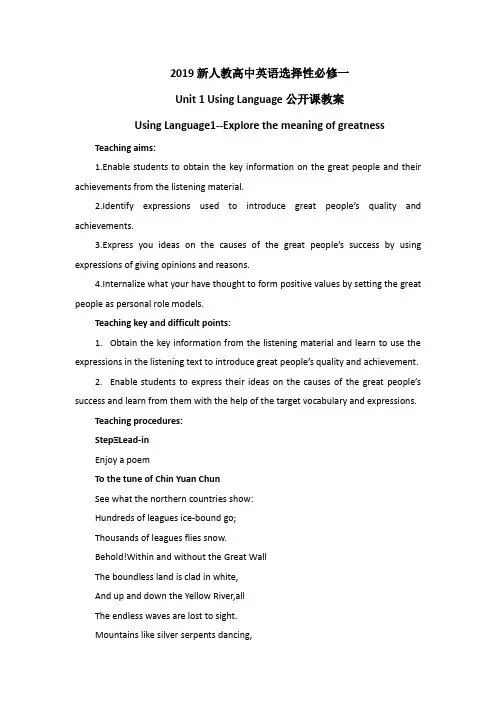
2019新人教高中英语选择性必修一Unit 1 Using Language公开课教案Using Language1--Explore the meaning of greatness Teaching aims:1.Enable students to obtain the key information on the great people and their achievements from the listening material.2.Identify expressions used to introduce great people’s quality and achievements.3.Express you ideas on the causes of the great people’s success by using expressions of giving opinions and reasons.4.Internalize what your have thought to form positive values by setting the great people as personal role models.Teaching key and difficult points:1.Obtain the key information from the listening material and learn to use the expressions in the listening text to introduce great people’s quality and achievement.2.Enable students to express their ideas on the causes of the great people’s success and learn from them with the help of the target vocabulary and expressions.Teaching procedures:StepⅠLead-inEnjoy a poemTo the tune of Chin Yuan ChunSee what the northern countries show:Hundreds of leagues ice-bound go;Thousands of leagues flies snow.Behold!Within and without the Great WallThe boundless land is clad in white,And up and down the Yellow River,allThe endless waves are lost to sight.Mountains like silver serpents dancing,Highlands like waxy elephants advancing,All try to match the sky in height.Wait till the day is fineAnd see the fair bask in sparkling sunshine,What an enchanting sight!Our motherland so rich in beautyHas made countless heroes vie to pay her their duty.But alas!Qin Huang and Han WuIn culture not well bred,And Tang Zong and Song ZuIn letters not wide read.And Genghis Khan,proud son of Heaven for a dayKnew only shooting eagles by bending his bows.They have all passed away;Brilliant heroes are thoseWhom we will see today!T:Dear class,let’s read the poem together. Do you know who wrote it? Which part do you like best? Why?Ss: It was written by Chairman Mao. I like the last sentence. Because it emphasises the important role that the present great people play and gives us the confidence in the present age.T:Yes, the age needs heroes and heroes create the age,too.So let’s know more about those great people and their achievement.StepⅠListening practiceActivity 1Match the people with their achievements.(1)Elon Musk A.founder of modern nursing(2)Bill Gates B.founded high-tech and futuristic companies(3)Jack Ma(Ma Yun) C.managed the SARS outbreak(4)Alexander Fleming D.made great advancement in online shopping(5)Florence Nightingale E.made home computing accessible(6)Zhong Nanshan F.discovered penicillinSuggested answers:(1)—B(2)—E(3)—D(4)—F(5)—A(6)—CActivity 2Fill in the blanks.(1)Elon Musk:He is the guy who founded a private space company,and also some other companies.He’s made .He is trying to help the of humankind.(2)Bill Gates & Jack Ma:They are really ,too.Just think of all the money they make.They have contributions to society.Bill Gates has given us home and Jack Ma makes it so easy to .(3)Zhong Nanshan:He is our ,who managed the SARS outbreak.Suggested answers:(1)millions of dollars;future(2)smart;positive;computing;shop online (3)personal heroActivity 3Listen to the conversation again.Who does each speaker admire?Tick in the table below.(红色为学生填写部分)Dr Wang Wang Lin Anna SmithElon Musk√Bill Gates√√Jack Ma√Zhong Nanshan√Florence Nightingale√Alexander Fleming√Dr Wang√Activity 4Listen again and answer the questions.(1)Why does Dr Wang say “money isn’t everything”?(2)What is the real reason Anna admires the famous people,and what examples does she give?(3)What kind of person do you think Wang Lin admires?Why?Suggested answers:(1)Because some people like Alexander Fleming,Florence Nightingale and Zhong Nanshan don’t make millions of money,but their contributions to health care have saved uncounted lives.(2)The real reason is that those people have worked so hard to achieve their goals and made uncounted contributions to society.She gives the examples of Elon Musk and Bill Gates.(3)She admires those who do good things inspiring her and her life.Because she lists the examples of Jack Ma and her father.StepⅢPost-listeningFinish the summary of the whole listening material.StepⅣTalkingActivity 1 Prepare small notes with deeds of celebrities, with one celebrity on each note,and let one student read the descriptions,other students guess who it is,and then classify according to the table and write them in the table below.Well,①er,...③ReallyYeah,I mean,I understand what you're saying...Well,I guess...Anyway,.. You see/know,... Just a moment. So,...Hang on a second.Well,it's on the lip of my tongue.May I think about that for a momentI've nearly got it,er,...How can/shall/should I put this/itWhat I want to say is...Let me think about this/that for a moment.Use the tip-list to help each other express your thoughts and ideas in a reasonable and complete way.(1)Body language:stand straight,proper gestures and eye contact with the audience.(2)Think for seconds before you speak out.(3)Use proper language fillers above to fill your stop time.(4)Give a summary of what you have introduced at the end of your introduction.Suggested answer:Jack:Bill,what makes these people great Bill:Um,may I think about that for a moment Jack:Jim,what's your opinion about itJim:I think it's the persistence that makes them great just like the father of India,er,...It's on the tip of my tongue,but...Bill:Mahatma Gandhi.Jim:Right.Bill:Besides,I guess it's also their wisdom that keeps them free from the dangers like Mao Zedong.Jack:You are both right.Activity 3 Use the discussion to draw conclusions about the meaning of greatness. The following expressions may help you. Then report back to the class.Suggested answer:Hello,everyone! The greatest person I know of is Dr Zhong Nanshan,who managed the SARS outbreak in China in 2003. Now it's he who prevented the COVID-19 from quick spread all over the country once again. To me, greatness means sacrifice and devotion. Dr Zhong Nanshan took risks entering the isolated area to cure the patients,summarizing the infected but recovered cases and sharing his successful experience with other home and abroad doctors. He serves as a good role model and makes great contributions to society. That's all. Thank you!Using Language2--Introduce someone you admire Teaching aims:1.Enable students to learn Albert Einstein’s life and his achievements.2. Figure out the organization and language features of the text.3.Identify how to introduce someone you admire.4. Write an introduction about someone you admire.Teaching key and difficult points:1.Enable students to figure out the organization and language features of the text2.Guide students to write an introduction about someone they admire.Teaching proceduresStepⅠLead-inReview some achievement of Tu Youyou and show the description of another man’s achievements.Ask the students guess who he is.StepⅠWhile-readingActivity1 Read for predictionsLook at the title and picture and predict what kind of article this is?The text mainly talks about Einstein’s and .Suggested answers:life;achievementsActivity2 Read for the detailed information1.Which of the following about Albert Einstein are not included in the passage?A.his achievementsB.his familyC.his characterD.his experiencesE.his hobbiesF.his appearanceG.his death H.his wife and childrenSuggested answers: B E H2.Read the passage again and complete the timeline.Suggested answers:Activity 3 Discuss the following questions in pairs1.Apart from his remarkable achievements,what does the passage tell us about Einstein’s life?2.What impressed you most about Einstein?State your reasons.Suggested answers:1.Although world-famous,he was still an ordinary and funny person who was also full of a childish and warm heart.2.When faced with failure or difficulties,he didn’t give up and chose to workhard to achieve his dream.For example,he failed in the entrance exam,but he chose to study harder for another year to achieve his dream.Moreover,because he was Jewish when Hitler came to power,the doors of academic institutions were closed to him.But after he succeeded in moving to America,he made great achievements in physics and mathematics.Activity 4Read for the organization and language features1.What type of writing is this text?How does the writer develop the text?2.Find the descriptions that tell us what Einstein looked like and what kind of person he was.3.What rhetorical devices are used in the passage?Give examples.Suggested answers:1.The text is a biography,which is developed chronologically.2.He had a thick moustache and long white hair,which sometimes stood on end as though he had just received an electric shock.Although he was a genius, he sometimes forgot things, like his friends’ birthdays.But despite his peculiarities, he was loved by his friends and neighbours.There is even a story about how he helped a little girl who knocked on his door and asked for help with her homework.In fact, Einstein often encountered people on the street who would stop him and ask him to help explain things.After many such occasions, he finally started saying, “Pardon me! Sorry! Always I am mistaken for Professor Einstein!”3.Analogy:as the new Isaac Newton;personification:long white hair,which sometimes stood on end;simile:as though he had just received an electric shock;metaphor:the doors of academic institutions;euphemism:passed away.StepⅠ Write an introduction about someone you admire1.Choose the person you are going to write about.It should be someone you think is great in some way.It can be an ordinary person,such as a parent,a relative,ora friend.2.Make a list of things that need to be included in your introduction.e your notes to write your introduction and sum up how you feel about this person.Writing material:请根据以下材料,写一篇介绍我国明代(the Ming Dynasty)医学家(medical scientist)李时珍的文章。
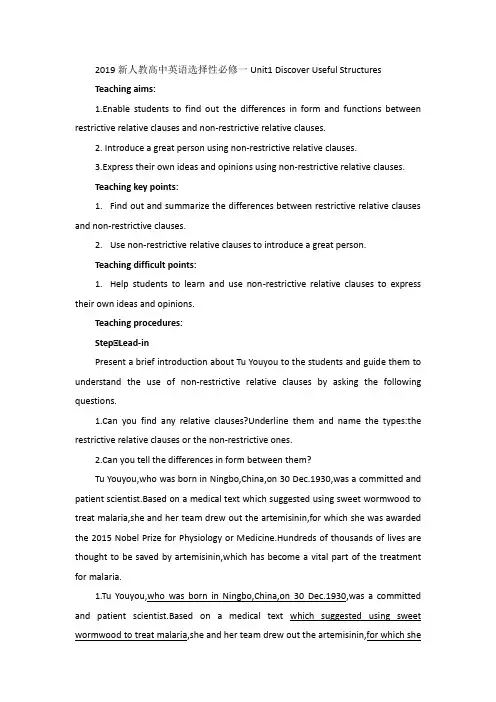
2019新人教高中英语选择性必修一Unit1 Discover Useful StructuresTeaching aims:1.Enable students to find out the differences in form and functions between restrictive relative clauses and non-restrictive relative clauses.2. Introduce a great person using non-restrictive relative clauses.3.Express their own ideas and opinions using non-restrictive relative clauses.Teaching key points:1.Find out and summarize the differences between restrictive relative clauses and non-restrictive clauses.e non-restrictive relative clauses to introduce a great person.Teaching difficult points:1.Help students to learn and use non-restrictive relative clauses to express their own ideas and opinions.Teaching procedures:StepⅠLead-inPresent a brief introduction about Tu Youyou to the students and guide them to understand the use of non-restrictive relative clauses by asking the following questions.1.Can you find any relative clauses?Underline them and name the types:the restrictive relative clauses or the non-restrictive ones.2.Can you tell the differences in form between them?Tu Youyou,who was born in Ningbo,China,on 30 Dec.1930,was a committed and patient scientist.Based on a medical text which suggested using sweet wormwood to treat malaria,she and her team drew out the artemisinin,for which she was awarded the 2015 Nobel Prize for Physiology or Medicine.Hundreds of thousands of lives are thought to be saved by artemisinin,which has become a vital part of the treatment for malaria.1.Tu Youyou,who was born in Ningbo,China,on 30 Dec.1930,was a committed and patient scientist.Based on a medical text which suggested using sweet wormwood to treat malaria,she and her team drew out the artemisinin,for which shewas awarded the 2015 Nobel Prize for Physiology or Medicine.Hundreds of thousands of lives are thought to be saved by artemisinin,which has become a vital part of the treatment for malaria.2.Restrictive relative clauses:no comma is in front of the clause;Non-restrictive relative clauses:there is a comma in front of the clause.StepⅠObserve and analyseActivity 1Read the following sentences and underline the relative clauses.Then name the two types of clauses and state their functions by filling in the following table.(红色为学生填写)(1)They tested hundreds of Chinese medical treatments that showed promise in the fight against the disease.(2)Tu Youyou was awarded the Nobel Prize,which is considered one of the highest international honours a person can receive.(3)Tu Youyou went to Hainan,where malaria was more common,to study malaria patients.(4)Later,the medicine was tested on malaria patients,most of whom recovered.Sentence TypeStructureFunction Antecedent(先行词)Part ofspeech in asentence(句子成分)(1)Restrictive hundreds ofChinesemedicaltreatmentssubjectDescribe and modify the kindof medical treatments theytested.(2)Non-restrictivethe NobelPrizesubjectGive extra information aboutthe Nobel Prize.(3)Non-restrictiveHainan adverbialGive extra information aboutHainan.(4)Non-restrictivemalariapatientsobjectGive extra information aboutthe patients.Activity 2Aspect(方面)RestrictiverelativeclausesNon-restrictive relative clausesForm(形式)Nocomma(,)isin front ofthe clause.There is a comma(,)in front of the clause.Relative(关系词)“That”is included.“That” is forbidden to use.Function ·A restrictiveclausemodifies thenoun thatprecedes itin anessentialway.·Restrictiveclauses limitor identifysuch nounsand cannotbe removedfrom asentenceA non-restrictive clausedescribes a noun or a sentence in a nonessential way,givingextra information,an explanation,or acomment on a noun or a sentence.withoutchangingthesentence’smeaning.StepⅠPracticeActivity 1Rewrite the sentences using non-restrictive relative clauses.EXAMPLEThe book tells us about Alexander Fleming.He discovered penicillin.The book tells us about Alexander Fleming,who discovered penicillin.Q1:Can you summarize the steps to rewrite the sentences?Q2:Try to rewrite the following sentences using the steps.Q3:How do the sentences flow differently?(1)We were very impressed by the old man.He was not willing to acknowledge defeat.(2)Afterwards,Einstein had to flee Germany.Hitler was in power there.(3)There is nothing we can do to help Linda.Her circumstances are beyond our control.(4)The teacher asked us to listen to a speech by his favourite novelist,J.K.Rowling.It inspired us a lot.(5)The building under construction was designed by I.M.Pei—a famous Chinese-American architect.He was born in Guangzhou,China.(6)I was asked to explain the project with the help of a flow chart.It was a big challenge for me.Suggested answers:Q1:Step 1:find the repeating part;Step 2:replace the repeating part with a suitable relative;Step 3:replace the stop(.)with a comma (,).Q2:(1)We were very impressed by the old man,who was not willing to acknowledge defeat.(2)Afterwards,Einstein had to flee Germany,where Hitler was in power.(3)There is nothing we can do to help Linda,whose circumstances are beyond our control.(4)The teacher asked us to listen to a speech by his favourite novelist,J.K.Rowling,which inspired us a lot.(5)The building under construction was designed by I.M.Pei—a famous Chinese -American architect,who was born in Guangzhou,China.(6)I was asked to explain the project with the help of a flow chart,which was a big challenge for me.Q3:In each case,there are two short sentences which sound separate to each other.By combining the two simple sentences together using non-restrictive relative clauses,the sentence becomes more varied and flows better.Activity 2Decide whether the sentences are right or wrong.Correct them where necessary.(1)Please write down these phrases,all of them will be useful in your writing.(2)As a consequence of sending in his application late,he did not get a patent for his invention,that was not surprising at all.(3)The researchers are evaluating thousands of plants,which have distinct medical properties.(4)The gentle old man is the only person,whom I can trust.(5)Have you done all what you can to help the people in need?(6)Is this the botanical institute where you visited last week?Suggested answers:(1)Please write down these phrases,all of which will be useful in your writing.(2)As a consequence of sending in his application late,he did not get a patent forhis invention,which was not surprising at all.(3)√(4)The gentle old man is the only person,whom I can trust in.(5)Have you done all that you can to help the people in need?(6)Is this the botanical institute which/that you visited last week?StepⅠLanguage use and shareLanguage use and shareActivity 1Write a few sentences about some great people with the information given e relative clauses.And then share and evaluate the writing with each other.Song QinglingDr Sun Yat-sen’s wife;one of the top leaders in modern Chinese history;devoted her life to improving the welfare of women and children.Neil ArmstrongThe first man to land on the moon in July 1969;“That’s a small step for (a)man,one giant leap for mankind.”Norman BethuneCame to China in World War Ⅱ;worked selflessly in China as a doctor and saved many Chinese people.Lu XunA leading figure of modern Chinese literature;Lu Xun Literary Prize—one of China’s top four literary prizes,awarded every three years.Joan of ArcA girl dressed as a man;went to fight for her country;helped drive the English invaders out of France.Suggested answers:Song Qingling,who was Dr Sun Yat-sen’s wife and one of the top leaders in modern Chinese history,devoted her life to improving the welfare of women andNeil Armstrong,who was the first man to land on the moon in July 1969,said,“That’s a small step for (a)man,one giant leap for mankind.”Norman Bethune,who came to China in World War Ⅱ,worked selflessly in China as a doctor and saved many Chinese people.Lu Xun was a leading figure of modern Chinese literature.Lu Xun Literary Prize,which is one of China’s top four literary prizes,is awarded every three years.Joan of Arc,who was a girl dressed as a man,went to fight for her country and helped drive the English invaders out of France.Activity 2Work in plete the sentences using non-restrictive relative clauses to give extra information.Then share them with your group members.EXAMPLEI’d like to try... , ...I’d like to try that Chinese herbal medicine again,which seems to work best for my cough.(1)I would like to travel around..., ...(2)What impressed me most..., ...(3)My favourite scientist is..., ...(4)Finally we arrived at..., ...(5)My grandparents like..., ...(6)I wish to obtain..., ...(7)My best friend..., ...Suggested answers:(1)I would like to travel around Sichuan Province,where Jiuzhaigou locates.(2)What impressed me most about the film was the ending,which was quite moving.(3)My favourite scientist is Nikola Tesla,who was quite brilliant but also had some crazy ideas.(4)Finally we arrived at the zoo,which was closed for repairs.(5)My grandparents like going for outings in spring,which is good for their(6)I wish to obtain a driving licence,which is necessary if you want to drive a car.(7)My best friend came to visit last week,which was the first time I had seen him in years.。
【2019统编版】人教版高中英语必修第一册Unit 1全单元备课教案教学设计1.1 Period 1 Listening and Speaking教学目标与核心素养:1. Let students master the useful words and expressions about school clubs and ways to express their hobbies or interests2. Let students briefly understand functions of different clubs and be aware of the ways of choose a suitable club.3. Get students to practice grasping topics and details while listening a dialogue.4. Get students to talk about topics relating to campus clubs.教学重难点:Importance:1. Get students to practice grasping topics and details while listening a dialogue.2. Get students to talk about topics relating to campus clubs.Difficulty:Guide the students to combine the topic with useful expressions about interests and preferences, and express themselves freely .课前准备:1.Ask the students to make preparations in vocabulary and phrases related to the theme of the period.2.Help the students to finish the Guided Learning Plan教学过程:Step 1Warming upActivity 1Ask Ss to match the photos with the names of the clubs. And hold a brief discussion about what the students are doing in the clubs.Step 2 Listening (1)Activity 2Guide the students to listen to the first two conversations and choose the correct answers.Remind the students to pay attention to the Predict Content:“Before you listen, you can read the questions and choices. It will help you topredict what you will hear.”1.What are they learning about in Conversation 1 ?(A)A. HearingB. SoundsC. Dogs.2.The students are discussing_____ in Conversation 2.(C)A. school workB. relationshipsC. dating.3.Circle the two clubs where these two conversations happened. (A)(D)A. Science ClubB. Ballet ClubC. Nature ClubD. Debate ClubActivity 3Guide the students to listen to conversation3. Then finish the following exercise.1. Tick the activities that happen in each club.Ballet Club Nature Club Cartoon Club Volunteer Clublearn new movements listen to lectures watch cartoons help old peoplewatch dance programs grow plants writes stories clean up parksmake Ballet clothes work in a greenhouse draw cartoons give directions.2. Adams says that he likes ___________but is not so interested in _________ .(B)A. stories, cartoonsB. animals, plantsC. making friends, cleaning up.3. Which club do you think is suitable for Adam? Why?I think Adam should join the Volunteer Club because he likes to do something outdoors.Step 3 SpeakingActivity 4Organize the students to working pairs and help each other choose a school club.Make some preparations before pair work.Brainstorm USEFUL WORDS and EXPRESSIONS FOR THE PAIR WOWRK. Are you going to join …?. I’d like to…, but I am not sure….. Which club do you like to join?. Have you decided which club to join?. My dream is to be……. …is not for me.. I like …,but I am not so interested in….…Provide an example for the students to modify.EXAMPLEA: Hi, Sam! I've decided to join the Music Club.B: Good decision!A: How about you? Are you going to join a club?B: Yes I'm wondering which one I should choose:the Act Club or the Ballet Club?A: I guess the question is… Do you like dancing better than acting?B: Actually, I like acting better, but my friends go to the Ballet Club and I want to be with them.A: Hmm…If you ask me,I think you should choose what you like.Step 5 PronunciationActivity 5Listen and repeat.Guide the students to listen and pay attention to the combinations of lettersEncourage the students to add more words to each groupProvide help whenever necessary.al talk, wall, ball,fall,call, all…ay pay, stay, delay, day, may, play, display, away…ai paint, daily, gain, pain, hailstone, wait…are care, declare, dare, prepare, spare, scare…ar bar, hard, car, star, large, enlarge…er her, prefer, teacher, farmer, paper …ir bird, circus, circle, ,third, thirsty, fir, birthday, shirt, dirty……or horse, absorb, bore, door, story…or word, work…ur burn, hurt, fur, turn, nurse, turtle, purple…ee keen, tree, fee, seem, feet, teeth…ea clean, eager, teach, leave, speak…ea head, ready, bread, weather, sweater, heavy…ear clear, appear, fear, hear, dear, near, ear, …ear earn, heard, search, learn, earn, earth…oa boat, coach, coat, goat, load, …ow show, grow, low, blow, slow, follow, eyebrow……ow now, shower, town, down, how, tower…ou out, loud, about, loud, doubt, mouth, house, mouse…ore more, bored, forecast, forehead, core…2. Guide the students to listen to the proverbs and repeat. Notice the pronunciation of the letters in bold.1. The early bird catches the worm.2. Always prepare for a rainy day.3. Actions speak louder than words.4. All work and no play makes Jack a dull boy.5. Distance tests a horse’s strength. Time reveals a person's character.Period 2 Reading and Thinking教学目标与核心素养:1. Let students master useful words and phrases related to the text;2. Let students understand the challenges Adam meets in his new schooland compare the similarities and differences of their school and Adam’s;3. Help the students finish vocabulary exercises in the text book.4. Get students to understand they should learn to face difficultiesand challenges in senior high school for their own future.教学重难点:Importance:Help the students to master key words and phrases in the text.Guide students to compare school life in different places.3. Guide the students to learn about Adam’s school life and understand that everyone should overcome difficulties in a new situation.Difficulty:Guide the students compare their school life and Adam’s, and discussways to deal with challenges.课前准备:1.Ask the students to prepare new words and phrases related to the contents of the text.2.Mark the new words in the textbook, understand the meaning in context, or consult the dictionary to understand the meaning.教学过程:Step 1 Preparationfreshman ___________ junior high school ___________ Senior high school___________confusing ___________ choose courses___________ signup___________extra-curricular activities___________ hand out ___________ homeless people___________in the community ___________ get used to doing___________ keep upwith ___________challenge _________ topic________ fluent _________ graduate ________recommend ___________ literature_________ obviously_________quit_________be responsible for _________ schedule_________ editor_________Step 2 Warming upCompare school life in different placesActivity 1Guide the students to take part in the group work and discuss schoollife in and out of China.Ask Ss to work in groups and discuss the questions.What do you want to know about the school life in other countries?Possible answers:I want to know whether they take extra courses during summer or winter vocations.I wonder if they have enough free time to develop their own interests.I am interested in what subjects they study at school.…What would you tell a teenager from another country about school lifein China?I am happy to come to my new school and know a lot of new friends.Our teachers are patient and helpful.I feel a little worried about my study because I have more subjectsto learn.…Activity 2Read the text quickly to find the main idea of each paragraph.Guide the students to read the text quickly and fill in the blanks in this part.Possible answers:Paragraph1:Senior high school is a Challenge.Paragraph2:It is important to choose courses.Paragraph3:Extra-curricular activities are also important.Paragraph4:A senior high student must work harder and be more responsible.Step3 Intensive readingActivity 3Read the text again and answer the questions.Guide the students to read the text carefully and find the answers to the following questions.What causes did Adams choose? Which one do you think would be his favorite? Why?What does “make the team” in paragraph mean?What is Adam worried about?Is Adam confident that he will get used to senior school life? How do you know?Possible answers:Adam chooses Math, English chemistry, world history and Chinese. I think. English advanced literature is his favorite because he likes English, and he is good at it.It means joining the football team.He is worried that he can’t keep up with other students in his advanced course and get used to all the homework.Yes, he is. On the one hand, Adam knows that he has to study harderas a senior school student to be well prepared for his future. On the other hand, Adam knows that school advisers and teacher can give him help when he is faced with problems.Activity 4Complete the outline. Then discuss the questions below with a partner.Get the students to work in pairs and fill in the blanks after discussing the questions carefully. Encourage the students to find clues from the text.Guide the students to discuss the following questions and encourage them to answer the questions according to Adam’s story and their own situation.What kind of person do you think Adam is? Why?Do you face the same challenges as Adams? What other challenges areyou facing?What are some differences between Adam’s school and your school life?Possible answers:Adam is clear-minded and responsible for himself. When he chooses courses, he knows his advantages。
高中英语必修一unit1教案最终版标题:高中英语必修一Unit 1教案最终版一、教学目标1、掌握基本的英语单词和短语,理解并能够运用它们。
2、掌握基本句型,了解句子的构成和表达方式。
3、培养学生对英语的兴趣和爱好,提高他们的英语听说读写能力。
二、教学内容1、学习新单词和短语,包括单词的发音、词义、词性、用法等。
2、学习基本句型,了解句子的构成和表达方式。
3、通过对话和短文,让学生了解英语的基本语法和语言表达方式。
三、教学重点难点1、教学重点:掌握新单词和短语的发音、词义、词性、用法等。
2、教学难点:掌握基本句型的构成和表达方式,了解英语的基本语法和语言表达方式。
四、教学方法1、激活学生的前知:通过提问的方式,了解学生前期所学的英语知识。
2、教学策略:采用讲解、示范、小组讨论和练习等方式进行教学。
3、学生活动:进行小组讨论、角色扮演、朗读等活动,提高学生的英语口语表达能力。
五、教学过程1、导入:通过提问导入新课,引导学生进入学习状态。
2、讲授新课:讲解新单词和短语的发音、词义、词性、用法等,同时进行句型和语法的讲解和练习。
3、巩固练习:让学生进行小组讨论,用新学的单词和短语进行造句和对话,同时进行语法练习。
4、归纳小结:总结本节课所学的知识点,同时对学生的表现进行评价和反馈。
六、教学评价1、设计评价策略:通过小组讨论、角色扮演、朗读等方式对学生的口语表达能力进行评价。
同时通过作业和测试等方式对学生的单词、短语、句型和语法掌握情况进行检查。
2、为学生提供反馈:通过评价结果,为学生提供反馈和建议,帮助他们了解自己的学习情况,并指导他们如何进一步提高自己的英语水平。
七、作业布置1、抄写本单元的新单词和短语各三遍。
2、用新学的单词和短语写一篇小作文,不少于50个词。
3、完成课后练习题,巩固本单元所学的知识点。
高中英语必修一Unit1完整高中英语必修一是英语学习的重要阶段,而Unit1是这个阶段的基础单元。
龙文教育学科老师个性化教案教师学生姓名上课日期学科英语年级教材版本人教版学案主题必修一unit 1课时数量(全程或具体时间)第(1)课时授课时段教学目标教学内容必修一unit 1个性化学习问题解决必修一unit 1教学重点、难点难点:词汇重点:词汇教学过程一.词汇单词用法讲解survey 调查.测验add up 合计upset adj 心烦意乱的;不安的,不适的ignore不理睬.忽视have got to 不得不;必须concern(使)担比:涉及;关系到n 担心;关注.(利害)关系be concerned about 关心.挂念walk the dog 遇狗loose adj 松的.松开的vet 兽医go through 经历;经受Amsterdam 阿姆斯特丹(荷兰首都)Netherlands 荷兰(西欧国家)German 德国的.德国人的.德语的.Nazi 纳粹党人adj 纳粹党的set down 记下;放下.登记series 连续,系列a series of 一连串的.一系列;一套outdoors在户外.在野外spellbind 迷住;疑惑purpose 故意in order to 为了dusk 黄昏傍晚at dusk 在黄昏时刻thunder vi 打雷雷鸣n 雷,雷声entire adj 整个的;完全的,全部的entirely ady. 完全地.全然地.整个地Power能力.力量.权力。
Face to face 面对面地Curtain 窗帘;门帘.幕布dusty adj 积满灰尘的no longer /not …any longer 不再partner 伙伴.合作者.合伙人settle 安家.定居.停留vt 使定居.安排.解决suffer vt &遭受;忍受经历loneliness 孤单寂寞highway高速公路recover痊愈;恢复.Get/be tired of 对…厌烦Pack捆扎;包装打行李n 小包:包裹pack ( sth ) up 将(东西)装箱打包suitcase手提箱;衣箱overcoat大衣外套teenager 十几岁的青少年get along with 与…相处.进展gossip 闲话闲谈fall in love 相爱;爱上exactly 确实如此.正是;确切地山disagree 不同意grateful感激的.表示谢意的dislike不喜欢.厌恶join in 参加.加入tip提示.技巧.尖;尖端.小费倾斜;翻倒secondly第二.其次swap交换item 项目.条款英翻中1、survey n.2、add up3 、upset adj. vt. (upset, upset)4、ignore vt.5、calm vt. & vi. adj.6、calm(…)down7 、have got to8 、concern vt. n.9、be concerned about10、walk the dog11、loose adj.12、vet n.13、go through14、△Amsterdam n.15、Netherlands n.16、△Jewish17、German adj. n.18、△Nazi n. adj.19、set down20、series n.21 a series of22、△Kitty n.23、outdoors adv.24、spellbind vt. (spellbound, spellbound)25、on purpose26、in order to27、dusk n.28、at dusk29、thunder vi. n.30、entire adj.31、entirely adv.32、power n.33、face to face34、curtain n.35、dusty adj.36、No longer/not…any longer37、partner n.38、settle vi. vt.39、suffer vt. & vi.40、suffer from41、△loneliness n.42、highway n.43、recover vi. & vt.45、pack vi. & vt. n.46 、pack (sth) up47、suitcase n.48、△Margot n.49、Overcoat n.50、teenager n.51、get along with52、△gossip vi. & n.53、fall in love54、exactly adv.55、disagree vi.56、grateful adj.57、dislike n. & vt.58、join in59、tip n. vt.60、△secondly adv.61、swap vt.62、item n.中翻英1、n. 调查;测验2、合计3、t adj. 心烦意乱的;不安的;不适的vt. (upset, upset) 使不安;使心烦4、vt. 不理睬;忽视5、vt. & vi. (使)平静;(使)镇定adj. 平静的;镇静的;沉着的6、(使)平静下来;(使)镇定下来7、不得不;必须8、vt. (使)担忧;涉及;关系到n. 担心;关注;(利害)关系9、关心;挂念10、遛狗11、adj. 松的;松开的12、n. 兽医13、经历;经受14、n. 阿姆斯特丹(荷兰首都)15、n. 荷兰(西欧国家)16、犹太人的;犹太族的17、adj. 德国的;德国人的;德语的n.德国人;德语18、n. 纳粹党人adj. 纳粹党的19、记下;放下;登记20、n. 连续;系列21、一连串的;一系列;一套23、adv. 在户外;在野外24、迷住;迷惑25、故意26、为了……27、n. 黄昏;傍晚28 、在黄昏时刻29t、vi. 打雷;雷鸣n.雷;雷声30、adj. 整个的;完全的;全部的31、adv. 完全地;全然地;整个地32、n. 能力;力量;权力33、面对面地34、n. 窗帘;门帘;幕布35、adj. 积满灰尘的36、不再……37、n. 伙伴;合作者;合伙人38、vi. 安家;定居;停留vt. 使定居;安排;解决39、vt. & vi. 遭受;忍受;经历40、遭受;患病41、n. 孤单;寂寞42、n. 公路;大路43、vi. & vt. 痊愈;恢复;重新获得44、对……厌烦45、vi. & vt. 捆扎;包装;打行李n. 小包;包裹46、将(东西)装箱打包47、n. 手提箱;衣箱48、n. 玛戈(女名)49、n. 大衣;外套50、n. 十几岁的青少年51、与……相处;进展52、vi. & n. 闲话;闲谈53、相爱;爱上54、adv. 确实如此;正是;确切地55、vi. 不同意56、adj. 感激的;表示谢意的57、n. & vt. 不喜欢;厌恶58、参加;加入59、n. 提示;技巧;尖;尖端;小费vt. 倾斜;翻倒60、adv. 第二;其次61、vt. 交换62 、n. 项目;条款二.重点词组be good to 对….友好add up 合计another time 改时间get sth done 使…被做calm down 镇定下来have got to 不得不walk the dog 遛狗make a list of 列出hide away 躲藏;隐藏be concerned about 关心;挂念share sth with sb 和某人分享某物go through 经历;仔细检查set down 放下;记下a series of 一系列;一套be crazy about 对…着迷on purpose 故意in order to/ so as to 为了face to face 面对面地get along with 与…相处pack up 收拾,打理行装according to 按照;根据…所说have trouble with sb/sth 同某人闹意见;做…有困难communicate with sb 和…交际throw away the friendship 放弃/终止友谊try out 试验;试用join in 参加(活动)far and wide 到处look to sth 注意,留心某事fall in love 相爱ignorant of 无知的cheat sb (out) of sth 骗取某人某物have the/a habit of doing sth 有做…的习惯三.重点句子1.I wonder if…我想知道是否….2. It’s because…这是因为….此从句中because不能用since或as 代替3. What do you think a good friend should be like? 你认为一个好朋友应该是什么样的呢?4. While walking the dog, you were careless and it got loose and was hit by a car.=While you were walking the dog, …在遛狗时,你不小心让狗挣脱了绳子,结果狗被车撞了。
(当while, when, before, after 等引导的时间状语从句中的主语与主句的主语一致时,可将从句中的主语和be动词省去。
)5. Do you want a friend whom you could tell everything to, like your deepest feelings and6. I haven’t been able to be outdoors for so long that I’ve grown so crazy about everything to do with nature. 我已经很久不能去户外,所以我变得对自然界的所有东西都很感兴趣。
7. I can well remember that there was a time when a deep blue sky, the song of birds, moonlight and flowers could never have kept me spellbound. 我记得非常清楚,曾有一段时间,湛蓝的天空、鸟儿的歌唱、月光和鲜花,从未使我心醉神迷过。
8. It was the first time in a year and a half that I’d seen the night face to face.这是我一年半以来第一次目睹夜晚。